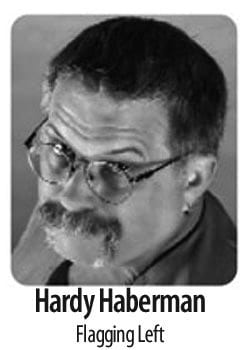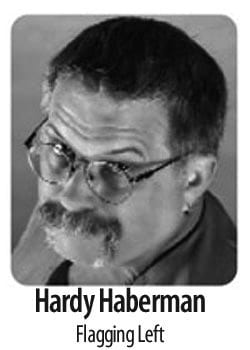 After the Dec. 2 terrorist attack in San Bernardino, the press and others are looking to find a moment when the two shooters were “radicalized.”
After the Dec. 2 terrorist attack in San Bernardino, the press and others are looking to find a moment when the two shooters were “radicalized.”
We look for someone to blame for their actions, as if they were inoculated with the Terrorist Virus. Perhaps there was an imam at a mosque that preached hatred of
Americans and they were so moved by his speech that they decided to go out and build pipe bombs and start arming themselves.
So what does this have to do with us? (By “us,” I mean LGBTQ Americans.) Probably not much, yet we live under threat of terror against our community every day.
Take the lovely woman in Pennsylvania, Kathryn Knott, who is shown on tape bashing a gay couple. Her words are pretty terrifying: “You dirty fu**ing fa**ot. Is that your f**king boyfriend? F**king fa**ot, f**king fa**ot, fu**ing fa**ot.”
Why is no one asking when she was “radicalized”?
What church did she attend where the preacher’s words managed to instill such hatred? What denomination preached violence against LGBTQ people? What did her parents do to encourage her?
Then there is the recent case of Marcel Schoeman, a personal trainer from London who was assaulted by a man in a car yelling, “You fag**ot … queer” while trying to run him down.
When was that driver “radicalized”? What group did he belong to that instilled such hatred that he terrorized and tried to kill a gay man?
It is tempting to blame mosques for all terrorism. But we ignore the platforms where anti-LGBTQ hate is spewed.
Hate crimes are terror in my book; the recent spate of bashings in Oak Lawn have effectively terrorized the Dallas LGBTQ community. But because they haven’t come from stereotypical “terror” groups, we reclassify them as assaults or robberies. Because the terror does not affect the general population, authorities give these incidents less attention.
Geoffrey Hubbard was not just the victim of a hate crime, he was a victim of terrorism. Terrorists using bats, box cutters and fists are waging a fear campaign in Dallas, and yet we don’t ask where these attackers were “radicalized.”
People like Robert Jeffress of the First Baptist Church of Dallas saying that acceptance of homosexuality and attacks against those who express their biblical view of marriage will “pave the way for that future world dictator, the Antichrist, to persecute and martyr Christians.” He then goes on to equate the current “persecution” of Christians to the Nazi Holocaust.
I would say that is pretty radical!
How many of his flock have been radicalized? Why isn’t the First Baptist Church of Dallas on the terror watch list?
The simple answer? Because Jeffress is white, straight and, supposedly, Christian.
Far from being persecuted, white American Christians hold all the cards, and they are dealing them out to favor their cause while instigating acts of hatred and violence with impunity.
The shootings at the Colorado Springs Planned Parenthood clinic by accused Robert Dear were the work of a very angry man. He claims he was a “warrior for the babies” and he was “radicalized” by the very kind of rhetoric preached from pulpits of fundamentalist radical churches and from politicians.
These people are being motivated to commit terrorist acts, but with the exception of Chris Cuomo on CNN in an interview with Carly Fiorina, the press refuses to raise the question.
Well, I am not afraid to raise it.
When will we start pointing the fingers at people who motivate hate crimes and terrorism who are not Muslim? When are we going to hold up the mirror to American society and recognize that we are often our worst enemy?
When are we going to ask our political leaders if they realize their bombastic rhetoric is “radicalizing” people? When are we going to ask our clergy, and specifically fundamentalist evangelical Christian pastors, how do hate filled sermons teach us anything about the “Prince of Peace”?
As Christmas approaches, I am reminded that it is this special time of year that Christians celebrate the light of peace coming into a broken world. Is it too much to ask for our radical fundamentalist brothers and sisters to start following the example set by the figure whose birth they celebrate?
Perhaps it is time to try another kind of radicalization. Perhaps it’s time to show the kind radical compassion and acceptance that can help heal our world instead of dividing it.
It’s a radical concept to stop using fear as a motivation and start using love and compassion as the key movers. It’s a radical concept to ask politicians, preachers and pundits to take responsibility for the acts of the listeners they inspire.
It’s a radical idea, but I believe it is something our community, our country and our world need right now.
Hardy Haberman is a longtime local LGBT activist and board member for the Woodhull Freedom Alliance. His blog is at DungeonDiary.blogspot.com.
This article appeared in the Dallas Voice print edition December 18, 2015.
Who is radicalizing the terrorists?
















